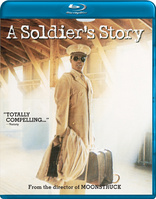A Soldier's Story Blu-ray Movie
HomeA Soldier's Story Blu-ray Movie 
Image Entertainment | 1984 | 101 min | Rated PG | Jan 31, 2012Movie rating
7.2 | / 10 |
Blu-ray rating
| Users | 0.0 | |
| Reviewer | 4.0 | |
| Overall | 4.0 |
Overview
A Soldier's Story (1984)
In 1944, as a black army company waits at a Louisiana base to be sent to the fighting in Europe, a tough sergeant is killed while returning to the base. His men suspect the Klan, and the brass in Washington send an outsider to investigate: an African-American captain, the first such high-ranking officer anyone on the base has ever seen. Despite the opposition of the base's senior officers, all of them white, Captain Davenport is determined to find the truth.
Starring: Howard E. Rollins Jr., Adolph Caesar, Robert Townsend, Denzel Washington, David Alan GrierDirector: Norman Jewison
| War | Uncertain |
| Drama | Uncertain |
| Mystery | Uncertain |
Specifications
Video
Video codec: MPEG-4 AVC
Video resolution: 1080p
Aspect ratio: 1.85:1
Original aspect ratio: 1.85:1
Audio
English: LPCM 2.0 (48kHz, 16-bit)
Subtitles
English SDH, Spanish
Discs
25GB Blu-ray Disc
Single disc (1 BD)
Playback
Region A (C untested)
Review
Rating summary
| Movie | 4.5 | |
| Video | 4.0 | |
| Audio | 4.0 | |
| Extras | 0.0 | |
| Overall | 4.0 |
A Soldier's Story Blu-ray Movie Review
Tragic Hero in a Sergeant's Uniform
Reviewed by Michael Reuben January 28, 2012A Soldier's Story is the film adaptation of Charles Fuller's drama, A Soldier's Play, which won the 1982 Pulitzer Prize, but nothing about the film feels stage-bound. Fuller adapted the play himself, and he and director/producer Norman Jewison used the resources of the big screen to accomplish what could only be suggested in the theater. They conveyed the heat, the sweat and the frustration of a 1944 U.S. Army unit forced to sit idly at a base in Tynin, Louisiana, waiting for their chance to join the fierce battle against the Nazi war machine in Europe. Why were these troops being held back? Because they were African-American, and unlike the Tuskegee Airmen, they didn't have specialized skills that a canny molder of public opinion like First Lady Eleanor Roosevelt could use to force the army to let them fight alongside white troops. In this sweltering and volatile environment, a black sergeant is murdered, and the ensuing inquiry shines a light into some ugly places in the white world, the black world and the hearts of individuals of both races. One of the many virtues of Fuller's writing is his refusal to settle for easy answers. As his story unfolds, the murder investigation becomes almost secondary to a relentless inquiry into the character of every person involved, including the tough investigator sent from Washington to compile an "objective" report (as if such a thing were possible in these circumstances). Fuller's work is powerful precisely because it takes into account all of the social forces that shape an individual's life, while still holding each person responsible for his choices and actions. Jewison saw A Soldier's Play during its successful off-Broadway run from November 1981 through January 1983 and immediately set about turning it into a film. He retained three of the original cast members: Adolph Caesar in the central role of murder victim Sgt. Vernon Waters (he would be nominated for an Oscar for the portrayal on film); Larry Riley as the popular platoon member C.J. Memphis; and in the pivotal role of Private Peterson, the only member of the platoon who dares stand up to the tough sergeant, a then little known actor by the name of Denzel Washington.
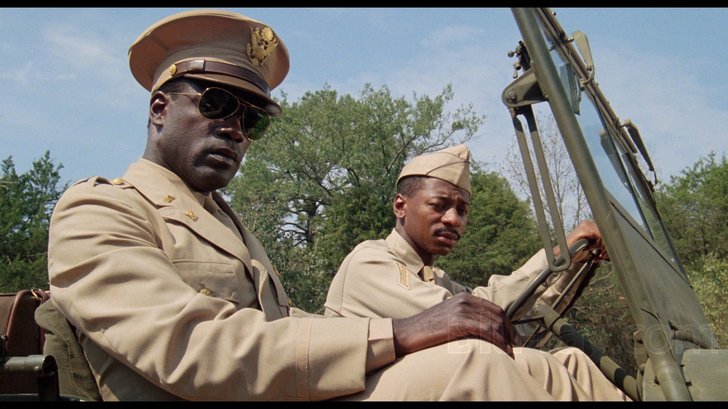
On a hot night in Tynin, Louisiana, Sgt. Waters (Caesar), who is black, exits the rollicking night spot run by Big Mary (Patti LaBelle) and staggers drunkenly through the white part of town back toward the base. Later we see the sergeant, muddy and bleeding on the road, yelling something about being hated just before an unseen hand fires a pistol, killing him. Waters's commanding officer, Captain Taylor (Dennis Lipscomb), oversees a routine search of the barracks of the sergeant's men, then restricts them all to base, cautioning them not to leap to conclusions about the killer(s). Private Henson (William Allen Young) says they all know it was the Klan. Captain Taylor, who has been commanding "colored troops" for his entire career, knows he is sitting on the proverbial powder keg. Meanwhile, the base commander, Colonel Nivens (Trey Wilson), who is a son of the South, takes the attitude that one shouldn't look too closely at the death of a single "colored" soldier. Of course, the colonel also has a secret report indicating that Sergeant Waters had some sort of encounter on the road with two white officers, and he certainly doesn't want that information becoming public knowledge. Into this den of intrigue arrives an outsider from Washington, an investigator with a law degree and something else that no one on this base has ever seen: captain's bars worn by an African-American. His name is Davenport (Howard E. Rollins, Jr.), and his arrival causes a general stir. The corporal sent to meet his bus, Ellis (Robert Townsend), almost forgets to salute; when he remembers, he salutes with new-found alacrity. White junior officers have to be reminded to do so. Black troops doing calisthenics stop in midbeat. ("That's enough, soldier!" barks their instructor. "Haven't you ever seen a colored officer before?" "No, sir!" comes the answer. "Have you, sir?" Silence.) Colonel Nivens arbitrarily limits Davenport's investigation to three days. Captain Taylor goes so far as to request Washington to recall him, because no one in Louisiana will charge a white man on Davenport's say-so. Davenport is undeterred. He proceeds directly to Sergeant Waters's former office and begins interviewing the men. They are a diverse assortment of personalities. Private Wilkie (Art Evans, best known as the air traffic controller in Die Hard 2) was a corporal, until Waters stripped him of his rank for being drunk on duty. Still, Wilkie says he admired the sergeant for his uncompromising devotion to duty. Private Henson, Corporal Cobb (David Alan Grier) and PFC Peterson (Washington) all played baseball on the team that Waters coachedóthe finest in the entire U.S. Army, according to Captain Tayloróbut all of them had issues with the way he treated the men under his command. As one after another tells his story, Sergeant Waters appears in flashback, and an increasingly complex and disturbing portrait takes shape. A pivotal figure is a private named C.J. Memphis (Riley), the baseball team's star player, who is no longer with the platoon for reasons that gradually emerge. After a few false starts and some tense standoffs with several white officers (including the base commander), Davenport does eventually close the case, but he's hardly satisfied by the result. There's a remarkable moment near the end of A Soldier's Story that echoes the famous shot devised (or, according to Hollywood lore, found accidentally) by Conrad Hall for the end of In Cold Blood. Davenport has just learned the exact circumstances of Waters's death, and he's alone at a window looking out into the rain. The raindrops coursing down the window cast shadows on his face like tears, but suddenly a single tear of Davenport's own joins them. It's as if, in that moment, Davenport has merged into the great cleansing flood that will be necessary if Sergeant Waters's death is to have any meaning. For what Davenport has learned (though it probably won't be in his official report) was that Waters had many murderers in addition to the hand that pulled the trigger, and one of them, as with every true tragic hero, was Waters himself.
A Soldier's Story Blu-ray Movie, Video Quality 
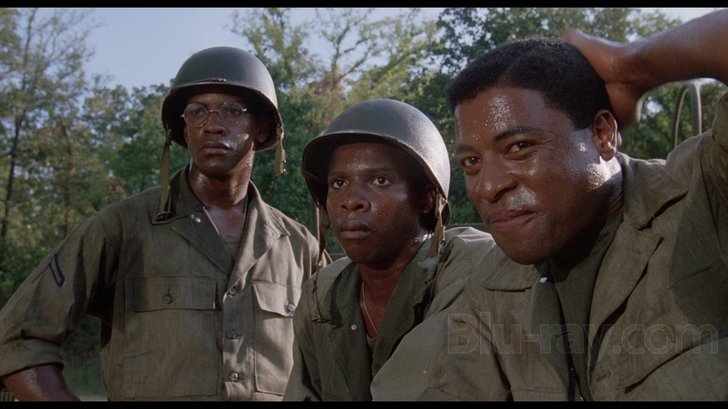
The cinematographer for A Soldier's Story was Australian master Russell Boyd, who has shot most of Peter Weir's films, winning an Oscar for Master and Commander: The Far Side of the World. Boyd used a palette that heavily favored earth tones to complement the army tans and greens and the lush southern locales (Arkansas stood in for Louisiana). Even in scenes shot at night, the color scheme is warm, because it's always hot in this part of the world, and Boyd's photography makes you feel it. The 1080p, AVC-encoded Blu-ray is consistent with the other titles in this latest wave of Sony catalogue releases from Image Entertainment, which is to say that it's superior and film-like with solid blacks, natural-looking grain patterns and particularly good detail for a film of this vintage. Fine elements in dust, smoke, vegetation and faces in crowds at a baseball game are readily visible in daytime shots. Night shots are less detailed, because this was an earlier era with less pervasive public lighting, and the cinematography shows essential story elements while keeping the rest shrouded in shadow. (It is a mystery story, after all.) The Blu-ray transfer also does justice to Boyd's bravura effect when, in a flashback, Waters recounts a horrific and crucial memory from his service in World War I. He's at the bar in Big Mary's, and as he turns to look into the mirror while speaking, everything behind him vanishes, gradually reappearing as he returns to the present. It's like a waking nightmare. As is customary with Image/Sony transfers, there was no evidence of high frequency filtering or artificial sharpening, and I saw no compression artifacts.
A Soldier's Story Blu-ray Movie, Audio Quality 
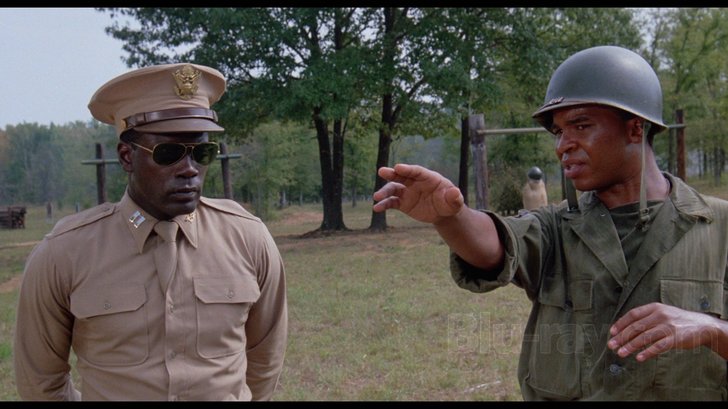
The film's original Dolby Stereo soundtrack is presented as PCM 2.0, and Herbie Hancock's bluesy scores sounds terrific, as do Patti LaBelle's vocals when she's singing at Big Mary's. (I wouldn't have minded more of her.) If the track is played through a decoder such as DPL IIx, it provides a small degree of surround ambiance but nothing substantial. More notable are the occasional left/right pans that are obviously part of the original sound design, especially in the opening shooting sequence. The dialogue is clear and understandable, notwithstanding the variety of southern accents. (I have to leave it to others to opine on their authenticity.)
A Soldier's Story Blu-ray Movie, Special Features and Extras 
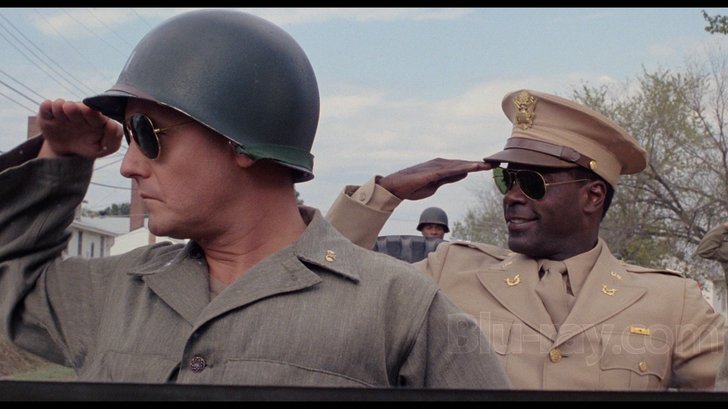
If you have the 1999 Sony DVD of A Soldier's Story, hold onto it. None of the special features has been included on the Blu-ray. The DVD had a commentary by director Norman Jewison; a documentary called "March to Freedom", which was narrated by Paul Winfield and featured interviews with Charles Fuller and retired African-American military men from World War II; and the film's trailer. Extras on the Blu-ray? None.
A Soldier's Story Blu-ray Movie, Overall Score and Recommendation 
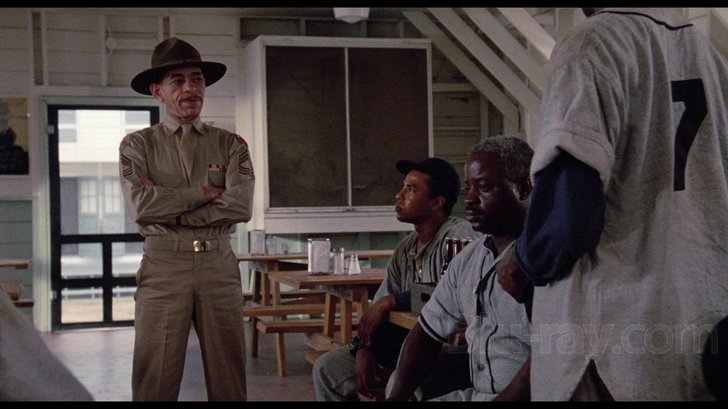
One of Norman Jewison's great talents as a director was assembling stellar casts, and A Soldier's Story is no exception, but too many of its members were cursed with ill luck. The film's lead, Howard E. Rollins, Jr., had already been nominated for an Oscar for Ragtime (1981), and would go on to star for eight seasons in the TV version of In the Heat of the Night. He'd be well-known today if not for his untimely death in 1996 at the age of 46. Adolph Caesar's memorable portrayal of Sergeant Waters brought him an Oscar nomination, a role in The Color Purple and a burgeoning film career that could have made him a household name if it hadn't been cut short by a fatal heart attack on the set of Tough Guys; Caesar died in 1986 at the age of 52. Larry Riley, who played C.J. Memphis, went on to co-star in Knots Landing until his death of AIDS-related causes in 1992 at the tender age of 38. Then again, the film did birth a superstar in Denzel Washington, but he's not the reason to see the movie. This was a once-in-a-lifetime ensemble working with truly great material, and that doesn't happen often. Highly recommended.
Similar titles
Similar titles you might also like

Hart's War
2002

The General's Daughter 4K
1999

In the Valley of Elah
2007

The Last Full Measure
2020

The Bridges at Toko-Ri
1954

Emperor
2012

The Caine Mutiny
1954

Courage Under Fire
1996

American Traitor: The Trial of Axis Sally
2021

Greyhound
2020

The Yellow Birds
2017

A Walk in the Sun
1945

They Were Expendable
Warner Archive Collection
1945

Never So Few
1959

Midway
1976

Strategic Air Command
1955

Tobruk
1967

Generation Kill
2008

The Exception
2016

Stalingrad
1993
